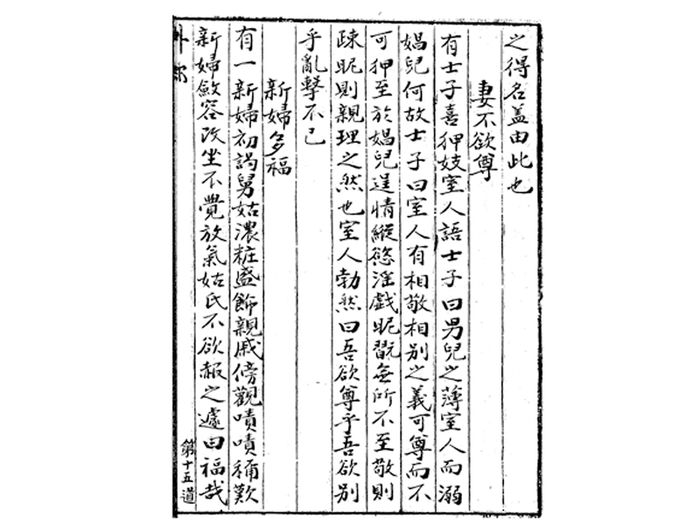(Translation) 妻不欲尊
| Primary Source | ||
|---|---|---|
 |
Title | |
| English | ||
| Chinese | ||
| Korean(RR) | ||
| Text Details | ||
| Genre | ||
| Type | ||
| Author(s) | ||
| Year | ||
| Source | ||
| Key Concepts | ||
| Translation Info | ||
| Translator(s) | Participants of 2018 Summer Hanmun Workshop (Intermediate Training Group) | |
| Editor(s) | ||
| Year | 2018 | |
Original Script
Translation
Student Translation : (Fran)
There was a literatus who enjoyed consorting with courtesans. His wife addressed him saying, "Why is it that men are so parsimonious with their wives and so infatuated with performing women?" The literatus answered, "Wives possess the righteousness of mutual respect and mutual distance. They should be honored and one should not take liberties with them. When it comes to singing girls, one can indulge feelings and succumb to desires, engage in licentious play and sporting familiarity. There's nowhere one can't go. Respectfulness means being distant; being familiar means intimacy. This is the nature of the order of things." The wife spoke in great agitation: "Who says I want to be respected?" She beat on him wildly without end.
- Discussion Questions:
[Julian] I like that you've given more than one translation of 娼 here—I'm a big fan of showing the multiple textures of Chinese words in translation. I think "singing girl" is especially nice for capturing a relationship to 唱. My question (probably for Prof. Oh) is the nature of these words' etymological relationship: is it just a phonetic similarity that got rendered with the same phonetic marker in each character, or did the similarity grow out of a cultural association of prostitution and singing? (Or maybe degrees of both?)
(YO) 昌 shaped from 日 and 口, depicting singing at sun's appearing, hence 'scream, sing, ovation'. So it was the early script of 唱. (Qiu Xigui 裘錫圭) The extension to courtesan is, as Juliann guessed, through "singing girl".